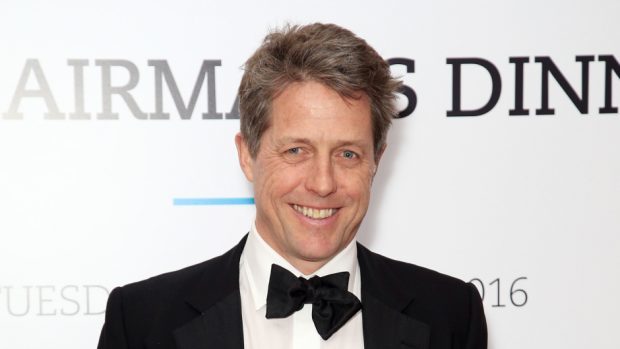Hugh Grant may have starred alongside a host of leading ladies as a bumbling, floppy-haired heart-throb but the British actor admits he was “bloody intimidated” when it came to working with Meryl Streep in his latest movie, Florence Foster Jenkins.
“I’ve worked with some big stars but, you know, Meryl is a very big star and a very highly regarded actress. Maybe the greatest actress ever, so that is pretty frightening,” he confides.
It’s early morning when we meet for our interview, and Grant is self-admittedly “hungover”, having attended the film’s premiere the night before. Dressed in jeans and a blue cotton shirt, his foppish accent is immediately familiar – the very hallmark of his character types.
At the mention of the positive reviews the movie’s garnered so far, he rolls his eyes, reaffirming his hostility towards the media.
Often cited as an anti-star, the 55-year-old is known for his comic timing, irony and facial expressions – all of which once saw him crowned as the king of rom-coms, with hits such as Four Weddings And A Funeral, About a Boy, Notting Hill and Bridget Jones’s Diary.
But it was the London-born actor’s personal life that would often come under scrutiny, overshadowing his work on screen and eventually resulting in him pressing pause on his career.
Pro-privacy, Grant gave evidence to the Leveson Inquiry, claiming that the Mail on Sunday hacked into his voicemails. He has since sat on the board of Hacked Off, an organisation that has campaigned for a free and accountable press since 2011.
But he hadn’t realised it would be “a full-time job”.
“I didn’t mean the campaigning bit of my life to last more than a few weeks, and it ended up, so far, lasting nearly five years!” he exclaims, summoning a smile. “But then Florence Foster Jenkins came along, and it was such a classy thing that I couldn’t say no.
“I don’t often get offered scripts directed by Stephen Frears, starring Meryl Streep,” he adds, scoffing at his response.
Set in 1940s New York, the biopic tells the true story of legendary New York heiress and socialite Florence Foster Jenkins (Streep), who obsessively pursued her dream of becoming a great singer. The voice she heard in her head was beautiful, but to everyone else, it was hilariously awful.
Her husband and manager, St Clair Bayfield (Grant), an aristocratic English actor, was determined to protect his beloved Florence from the truth. But when she decided to give a public concert at Carnegie Hall, accompanied by pianist Cosme McMoon (Simon Helberg of US sitcom The Big Bang Theory), St Clair knew he faced his greatest challenge.
“I was genuinely fascinated by Bayfield,” says Grant. “I quite liked being him, which is not always the case with characters I’ve played.”
Aside from having been sent a cassette of her singing in the Eighties, he confesses he “wasn’t up to speed” with Jenkins’ story prior to accepting the role, though does remember it being “hilarious”.
He turned to Google for research ahead of filming, and found a documentary about her.
“It’s quite fascinating getting deeper and deeper, researching a real-life character. But then there’s a danger; when you realise the creation the screenwriter made is not identical to the real human being. Then you have to choose, or in fact make up, a third version of your own.”
As for working with three-time Oscar winner Streep, he compares witnessing her talent to “watching Leonardo da Vinci drawing”.
“There is absolutely nothing she can’t do, and the thing that struck me most was that every single take she did was completely different from the one before,” Grant enthuses of the 66-year-old Suffragette and The Iron Lady star.
“I was a little bit frightened of Stephen Frears, the director, too,” he adds, his modesty rather charming. “He’s got a bit of a reputation of making classy award-winning films, which is not really where I come from. I had to do a certain amount of serious acting in this…”
He was taken by the combination of humour and emotion in the script.
“I thought it was funny and, at the same time, touching. It’s always a powerful combination if films can do both at the same time.
“I always think funny bits in films play better if they’re set against sad bits – dark notes – and the dark notes are played well in films if they’re sat against comedy,” he says. “It’s the perfect combo, and it’s not a difficult combination either. In a way, it’s sort of easy.”
Having long referred to film stardom as a “phase in his life” and insisting he fell into acting “by mistake”, Grant is only too happy to take a back seat when it comes to the perplexing world of celebrity.
Today, the father of four – he has two children with restaurant receptionist Tinglan Hong, and two with Swedish television producer Anna Elisabet Eberstein, with whom he is currently in a relationship – purposefully steers clear of the headlines.
But with a new red carpet experience under his belt for Florence Foster Jenkins, has it reignited a passion to rerurn to his A-list place in the film world?
“Maybe,” he says with a shrug, perhaps reluctant to give too much away.
“It’s been really full-on, but it does feel good,” he admits. “It’s refreshing to do something different and lovely to have a break from the politics.”
Florence Foster Jenkins opens in UK cinemas on Friday, May 6.
